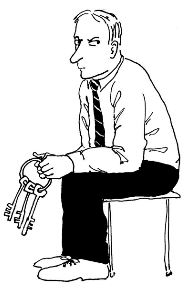The Jailer
In my post The Dominator vs The Friend, I gave a precis of the different personas within the abusive personality. Today we look at The Jailer. From my time attending The Freedom Programme the book by Pat Craven, Living With The Dominator became my bible. I refer to it extensively here.

Isolation is the method used by The Jailer to control us.
Tactics Used By The Jailer
- Might refuse to care for the children, or does so inadequately. They might not feed them, and may phone us whilst they’re crying. It’s an overlap with The Bad Father (as described by Pat Craven, although could be a woman). It is designed to make us feel that we can’t leave the children with them. We therefore stop doing so.
- We may be persuaded to stay at home and not leave them alone. Our jobs might be then be in jeopardy or lost if we call in sick too often to stay at home with them. They are jealous of us working with other men/women. Might say that we don’t need to work and that they will look after us.
- Might turn up at our place of work drunk and abusive. They might telephone us at work all the time. Our colleagues and managers might be subjected to abuse from them. Engineering a row when we’re trying to get out to go to work, possibly altering clocks to make us late. Will create a problem if we have to work late. Might ‘accidentally’ wipe work assignments off our computer.
- We may be physically prevented from leaving the house by being locked in. In extreme cases windows might be painted black so that we don’t know if it’s day or night.
- ‘Accidentally’ forgets to take keys with them so that we have to wait in for their return. Might go out with all they keys so that we can’t go out as we have no car keys.
- Makes appointments for things such as the washing machine engineer or delivery but at a time when they’re busy. We therefore have to stay in to keep the appointment.
- Clothes and shoes might be destroyed or hidden so that we have nothing to wear if we want to go out.
- A woman being controlled by the jailer might be kept pregnant. A man being controlled might find his partner pregnant and not feel able to leave
- We’re given impossibly long lists of tasks to complete so that we have no time to go out.
- If there are small children in the family, the jailer might drive off with the buggy in their car.
- In extreme cases a jailer has been known to train a dog to prevent the other person either from leaving
The Jailer controls where we go and who we see
- Checks the mileage on the car
- Demands bus or train tickets/receipts
- Calls constantly on the phone to check where we are
- Might buy us a videophone and demand that we show them where we are all the time.
- Times our visits to the shops/supermarket
- Refuses to allow us attend medical appointments either for ourselves or our children
- Security cameras might be installed in every room so that we can be watched all the time remotely
- Times us when we go out
The Jailer stops us seeing friends and family
- If our friends or family call they may not be fully or appropriately dressed
- They might be watching TV when people call and won’t turn it off, and may have the sound very loud
- Inappropriate behaviour might be used to make guests/visitors feel uncomfortable
- Sulking might be used to show displeasure at having visitors
- They might go into another room and leave you with your visitors, but you can feel a palpable atmosphere in the house
- When asked by visitors if he/she is ok, we might make excuses for them by saying that they’re a bit shy for example. Visitors are unlikely to want to come back or we know that it’s not worth inviting people over
- Our friends and family might be insulted by them. Or they might start an argument with us in front of visitors, or pick on us in front of visitors.
- Seduction might be used in one form or another. They might use sexual seduction on our friends. Or they might charm our friends and family so that no one believes us when we say that they’re abusive. We might be told that a friend of ours has tried to seduce them.
- We might be told that people don’t really like us. We’re told that we’re boring and unattractive, or look fat and like a slag. This has the effect of making us not want to go out or see these people
- A row might be engineered as we’re going out to spoil our outing
- They might insist on having sex with us just before we go out and not allow us to shower afterwards
- On our return home a row might ensue which will then spoil the event
- They might turn up wherever we’ve gone with friends and the offer us a lift home. This is designed to enable them to know exactly where we are, and to control how long we’re there.
- They often go everywhere with us to prevent us from seeing anyone alone. Everyone assumes that they’re totally devoted to us, but it’s actually controlling us. We’re told that it’s not safe for us to go out alone and that they just want to ‘protect’ us.
- The jailer might suggest ‘romantically’ that it would be great to live somewhere else. This is likely miles away from friends and family. Or they may take a new job without discussing it with us first, and it will be miles away.
What makes the Jailer believe they have the right to isolate us
If the jailer is a man he believes that you are ‘his woman’ and that a ‘real man’ keeps her in the home. They think that it is normal to isolate, not abusive. A woman is like a pet and needs to be controlled and kept in. They believe that we can’t be trusted to go out alone.
They think that we need to be controlled sexually. If we go out alone we will have sex with every man/woman that we see!
A male jailer will believe that men own women, that they are property. Women are only useful for CFCs (cooking, f*cking, cleaning).
Another thing a male jailer might believe is that women don’t do real work. Our wages are ‘pin money’ – even if we earn more than he does. Women should be kept, men are the breadwinners. If he complains that there isn’t enough money coming into the household we offer to find a job. But we’re then told that our wages won’t make a difference.
Where do the Jailer’s beliefs come from?
Looking at the childhood, many people have grown up in families where women don’t work. Not only did they not work, they weren’t encouraged to have a social life away from their husband.
Sport may also play a part. Sports such as football, rugby and cricket gain far more publicity when played by men. Some clubs don’t allow women to join them. It is encouraging to see that recently women’s sport is now gaining much more media coverage.
Similarly, some other jobs in the public eye have mainly been a male domain. It’s great for example to now see many more women hosting radio shows.
Way back in the 1950s when women married they had to leave work. Universities resisted allowing women to attend or to get degrees. Women were not permitted to be actively involved in society, e.g. the ability to vote.
Movies and TV soaps show women as housebound, as housewives. Adverts showed women doing the housework.
Phrases such as ‘her indoors’ put women firmly in the house.
Sexual control is evident in some cultural practices globally such as genital mutilation.
Shared beliefs
Initially the isolation tactics might be seen as romantic, a desire to keep us to themselves. We allow ourselves to spend more and more time with them to the detriment of other relationships. Later on we might be ‘allowed’ to go out. A woman might use a phrase such as “he’s really good, he lets me go out with my friends!”. A man might have to “ask for permission” to go to the pub or a football match with friends.
How does this affect us?
Financially
Someone who has been stopped from working or going to college to gain an education is dependent on the jailer. We might leave the security of a job or get the sack. This means that we are financially dependent on the jailer or the state. We might give up a career that we enjoy, our self esteem is likely to suffer. Our potential in the workplace is not realised. Without qualifications our earning potential is likely to be affected. Once again we are dependent on the jailer.
Crime
Without money we are unable to buy new clothes, again our self esteem drops. Our ability to get another job is lower as we might look scruffy and down at heel. We might be tempted to commit crimes such as shoplifting. Pat Craven describes meeting women whilst she was a probation officer who were stealing nappies and food. This is not shoplifting for the sake of it, but for the sake of survival. A lack of money makes it so much harder to leave.
Mental impact
When you are effectively kept prisoner by the jailer depression and anxiety may become a problem. Agoraphobia, bulimia, anorexia, dependence on drugs or alcohol might be something that we CAN control. Our self respect is lost, our sense of self. We might start to hate ourselves for not having the strength or ‘backbone’ to leave. But at the time we don’t realise that it’s not a question of ‘backbone’. The Stockholm Syndrome and trauma bonding play a huge part.
Family and Friends
When we are isolated from family and friends we lose our support network. There’s no one there to ask or tell about the way we’re being treated. Without a second opinion the situation we’re in becomes our ‘normal’. We are lonely, and we have no fun.
The Liberator
A normal and decent partner will encourage friends and family to visit. They will make visitors feel welcome. If it’s a social occasion for both of you they will be pleasant and it will be enjoyable. If it’s a social occasion for just you they might say hello to everyone and then leave you to enjoy yourself, but without bad feeling.
We will be encouraged to socialise with friends and family on our own. They will tell you how good you look when you’ve dressed up. They won’t wait up for us to come home but will leave lights on for us.
The liberator will encourage a partner to study for qualifications if we want to. We will be encouraged to work if we want to. They will boost our confidence. They will participate in their fair share of the housework and childcare. We are encouraged to have our own interests and hobbies. They will trust us to go out on our own, to work with other people. Our financial independence and contribution to the household finances is encouraged and welcomed.
